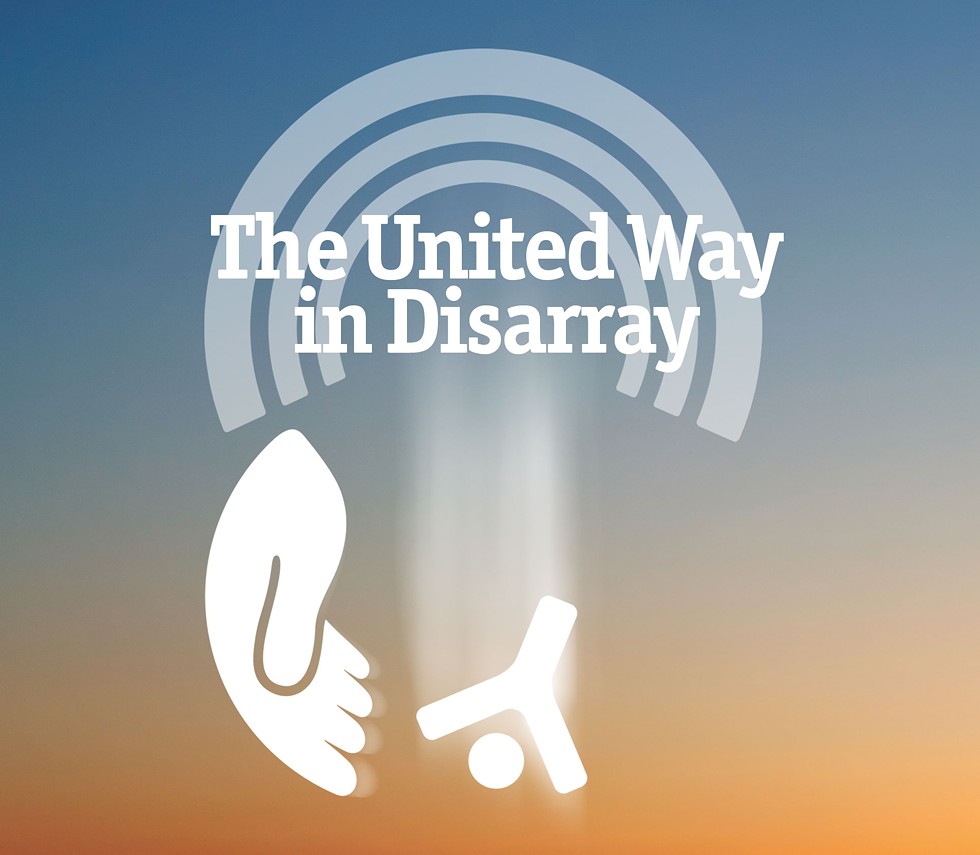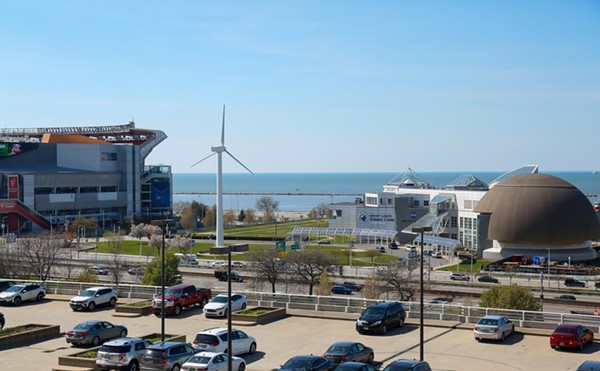The United Way of Greater Cleveland will announce Wednesday sweeping cuts to the annual funding it provides to area nonprofits, sources have told Scene. Roughly 70 so-called "partner agencies" and nearly 100 individual programs will be affected.
Though United Way would not confirm when asked directly, internal sources say CEO August "Augie" Napoli is likely to announce across-the-board reductions. All funded agencies, which typically learn their allocation levels in June, are expected to be funded at 50 percent of their 2020 level through the end of the year, after which the funding picture is totally unknown.
These cuts will drain more than $3 million from the region's nonprofit ecosystem and will likely cause reduced staffing levels and services in programs that deal with hunger, workforce development, violence prevention, financial stability, kindergarten readiness and housing solutions, all of which have been clustered under United Way's "community hub for basic needs."
The dramatic cuts arrive less than a year after the organization's "pivot point," announced in June 2019, a masterclass in public relations through which significant cuts were framed as a paradigm shift in funding that would allow United Way to focus on both the root causes of poverty and its immediate effects.
During that process, the organization managed to slough off nearly $2 million in annual contributions — in the middle of what partner agencies had been told was a three-year funding cycle — and eliminated five "focus areas" for programmatic funding, including the area which, according to the Urban Opportunity Agenda, would have had the most significant impact on poverty reduction in Cleveland: job access and transportation.
The newly announced cuts will disrupt or dismantle a wide range of area programs, from a food and clothing distribution program at the May Dugan Center ($16,000) to a Step Up to Quality (SUTQ) Early Childcare Professional Development Program at Starting Point ($145,000). The plurality of programs currently receive funding in the range of $50,000 to $80,000 per year. But 10 individual programs — including two at the Centers for Families and Children; workforce development programs at Lutheran Metropolitan Ministries and Towards Employment; financial stability programs at CHN Housing Partners and the Legal Aid Society of Greater Cleveland; the Earned Income Tax Credit Coalition at Enterprise Community Partners; a housing stability program at EDEN; and a vocational rehabilitation training program at Vocational Guidance Services — all currently receive annual funding above $100,000.
Various explanations for these cuts may be furnished today. United Way's top executives have reportedly been cooped up in a "war room" shaping messaging on the topic for some time, and they may enlist the local press to help deploy their PR strategy in the coming weeks. They may try to portray the current reduction as an exciting advancement in Cleveland's battle against poverty. They may call it something like a "difficult but necessary" decision in the service of a greater good. These lofty messages should be ignored. The story behind the cuts is much deeper and more complicated.
More than 10 current and former employees, including those in high-level positions, spoke to Scene for this piece under explicit guarantees of anonymity. Many of them said that the United Way, which raises millions of dollars every year through its annual appeal, has been unable to navigate a landscape of reduced workplace giving and renewed skepticism about the role of corporate-tinged nonprofits. They say that Augie Napoli and his team of highly-paid VPs are scrambling to invent "disruptions" in the philanthropic space but are doing so without the appropriate planning, communication or vision.
Moreover, sources say, United Way leadership has been unwilling or unable to grasp the truth: Workplace giving has declined year-over-year for more than a decade — sharply so during Napoli's tenure — and no amount of buzzwords, algorithms and brand refreshes are likely to reverse that trend, certainly not without a clearer articulation of United Way's role in Northeast Ohio. The widely held assumption among staff members is that the funding cuts last year and this year have nothing to do with the performance of partner agencies or the re-alignment of priorities. It's because of poor fundraising, ostensibly the organization's raison d'etre.
Right now, according to employees, United Way's agenda is whatever Augie Napoli and his VP of development, Aaron Petersal, say it is. Combating poverty? Championing race equity? Creating a "think tank with a purpose"? Doesn't matter, as long as it excites the donors.
"Frequently, strategies are developed and then left to die on the vine while we focus on a new flavor of the day," said one employee. "And then we repeat the cycle over and over."
The agenda, whatever it may be, is rarely communicated internally or externally. When Crain's reported in June that Sandy and Sarah Cutler had donated $1.5 million to launch a new United Way venture to "identify and grow solutions to address the root causes of poverty," it was the first time many on staff had heard. Among other things, marketing and development employees had no talking points when donors and partner agencies called to inquire about details. The same situation arose, concurrently, when cuts were announced as part of the funding pivot.
"Basically everyone in the marketing department had just been fired when I got there," said one former employee. "And it was complete chaos. We were brought on to build the new brand — doing social media, commercials — but with all the craziness around the cuts, it was like we became a marketing agency for United Way, if that makes sense. It was very crisis communications, very damage control."
Much of the PR in the wake of the 2019 cuts, and certainly the theme of Napoli's remarks at the organization's annual luncheon last year, was that United Way was actually doing more by cutting funding to partner agencies because they were shifting funding to invest in solving poverty at its roots.
This was meant to be the work of the Impact Institute. Napoli and Petersal have reportedly made rounds in pursuit of major gifts to fund the Institute, in some cases shocking local corporations and foundations with their enormous asks (in multiple instances, $1 million straight up), but its work remains mostly, if not entirely, theoretical. It was supposed to have been "powered by" Unify Labs, an advanced technology nonprofit which itself has lost most of its staff in recent months and never fulfilled its promise to solve poverty with blockchain and AI and so forth. Employees still don't have the foggiest idea what the Impact Institute is or does.
"But you can't ask questions," said one employee, who, like others, requested anonymity. "There is a culture of suspicion. If you question leaders, you might be labeled a 'negative person' or 'not a team player.' And you never know how things could play out. Will I be fired? Yelled at? Belittled? Black-balled if I leave?"
In spite of these fears, multiple employees have quit, often with no new job prospects awaiting them. The marketing and development departments have hemorrhaged so many staffers since 2016 that when we referenced "a mass exodus" in one recent interview, we had to clarify which one.
Scene asked former employees if we could quote them by name in our coverage, but they all insisted on anonymity. In some cases, they said they feared their new organizations would be blacklisted if they were named in a piece perceived as critical of the United Way. Napoli, they said, wouldn't think twice about such reprisals. He is known to wield funding like a weapon.
This current atmosphere of secrecy and mistrust has led to rampant rumor and speculation.
Among the more serious rumors: Some suspect that to compensate for reduced workplace giving, United Way has repeatedly dipped into its endowment fund to juke donor stats, a practice that may now be causing concern among the board of directors, a who's-who of the region's top corporate executives, plus a smattering of leaders at prominent area nonprofits. Indians owner Paul Dolan (chair) and Browns owner Dee Haslam (chair of the Marketing & Brand Strategy committee) both sit on the board's executive committee, to illustrate its regional clout.
Scene reached out to more than 20 members of the board in an effort to substantiate these rumors — they would have had to authorize endowment spending — but without exception, they either ignored our requests, declined to comment or directed us to United Way's head of corporate communications, Katie Connell, a crisis communications specialist lately of Delta Airlines.
Through Connell, we made multiple attempts to set up an interview with Augie Napoli. We were not granted one, but Connell instructed us to send written questions. We did so, sending 19 detailed questions that covered an array of topics based on our reporting, including those that sought confirmation about the forthcoming funding cuts.
In response, we received the following statement:
"It is our policy to share any agency-related communications or developments with the agencies we work with first. Generally speaking about United Way and our future, we are committed to helping those living in the deepest poverty across Cleveland. Very soon, we will share the final step in our organization's three-year strategic plan (announced in 2016) to maximize United Way's impact within the community we serve by targeting specific, measurable goals and outcomes to address the city's most challenging issues. In fact, in fiscal year 2019, United Way of Greater Cleveland invested $33.2 million in the community, including: 2-1-1 HelpLink and other direct services, the Impact Institute, federated and regional partners, agency grants directed by donors and agency grants determined by United Way's RFP process. Thanks to the generosity of our donors, we look forward to continuing to invest in meaningful, long-term change across the community through programs such as Right to Counsel and the Lead Safe Cleveland Coalition."
In other words, they chose not to answer any of our questions. (Connell did use the standard Orwellian PR/propaganda trick of referring to something as its opposite. So in the United Way's language, a substantial funding decrease will maximize impact.)
The state of United Way's endowment, incidentally, may have nothing to do with Wednesday's announcement. But employees and others can't help but speculate. Some partner agencies have also noted in off-the-record comments to Scene that United Way is, at this moment, completing a costly renovation of their downtown headquarters on Euclid Avenue. Was funding slashed to pay for these plush new digs, they wonder?
Who can say?
Just like the organization's long-term strategy and short-term decision-making, the factors underpinning the current cuts have not been communicated. This secrecy and/or lack of preparedness is consistent with what employees have variously called a "paranoid," "fear-based," "intimidating," "chaotic," "hostile," "miserable" and "terrible" workplace.
"It felt as though they were hovering over you and always checking in on your whereabouts," said one former employee who left United Way because of what they called an "unhealthy" work environment. "It seemed as though there wasn't a lot of trust."
Indeed. When Scene published a story about the emerging questionable relationship between United Way and Unify Labs this fall, an enraged Napoli, who employees say is prone to temper tantrums, reportedly prioritized a witch hunt to uncover the "leakers." And in recent weeks, mention of the forthcoming cuts have been scrapped from meeting agendas "because of questions coming from Scene Magazine."
Whether it was due to fear of leaks, fear of repercussions or because messaging had not yet been shaped, no substantive information about the current cuts has been communicated to staff. Per multiple employees, an all-staff meeting has been scheduled for later Wednesday at which talking points are likely to be distributed.
Just as troubling, and in apparent conflict with Connell's statement, no details have been communicated to partner agencies themselves. (At least not as of our print deadline). Eight executive directors who responded to Scene's requests for comment all confirmed that United Way had not reached out to inform them of funding changes. Two said that they had been notified that they would be receiving information about funding soon.
"This is literally the first I'm hearing about it," one local executive director told Scene by phone last week. "This is ridiculous."
"I can't comment on this because I don't know," said another. "I haven't heard these rumors, but I really hope it's not the case."
"Umm no," said a CEO who receives annual funding from United Way and had programs cut in 2019 as part of United Way's pivot. "I have not heard about this, but it would absolutely have a major impact."
"I would like to know what is going on to require this kind of drastic action," one local executive director wrote via email, after confirming that no one from United Way had reached out to apprise them of forthcoming cuts. "What are the factors? What else are they prioritizing instead? What is their strategy going forward? Why hasn't there been more communication leading up to this point?"
The most generous response came from an executive director who said that, while they had not heard rumors or received direct communication from United Way about funding reductions, further cuts "wouldn't be a huge surprise" because of allusions that Napoli and the board have made to ongoing organizational shifts.
Napoli has certainly foreshadowed deeper cuts. During coverage of the 2019 pivot, he said his heart broke to cut funding for area programs.
"But honestly, we have to do this if we're going to remain vital to the community," he told Crain's. "Because at the end of the day — this is a controversial statement — we don't exist to support the delivery system. We exist to support the person who's living under the thumb of poverty and to continue to retain the trust of the public that gives us the money to support the person in need."
The logic there is difficult to parse — how should funders support people in poverty if not by supporting those who deliver them services? — but it's truly God-level tough love when you consider that Napoli makes north of $330,000 and is now enjoying the fruits of a multi-million-dollar office renovation, paid for with donor dollars, while area service providers will be forced to make do with less. Perhaps it's superfluous to note that Cleveland remains at or near the top of virtually every poverty metric in the United States, including topping all big cities in childhood poverty and, recently, earning the distinction of having the worst educational and economic outcomes for black women.
Existing "to support the person who's living under the thumb of poverty," in any case, is something Napoli only started saying in 2018, after a rebranding effort which resulted in the organization's new central focus. Cleveland.com reported then on what they called Napoli's "epiphany." They described United Way's role as "tapping into its unique power to raise money, to convene the conversation [on poverty] and to condemn the racism that fuels social disparities."
With or without a grain of salt, we note that Advance Ohio, Cleveland.com's local parent company, received $140,000 in advertising dollars from United Way in 2017, according to the organization's 2018 tax filing, and that Chris Quinn was then serving on the United Way board of directors. He formally resigned in late 2019, when he stopped serving in the dual role of president of Advance Ohio and editor of Cleveland.com. But back in 2017 and 2018, Quinn could be heard regularly on WCPN's Friday reporters' roundtable praising United Way's commitment to poverty, often in conjunction with comments about the Cleveland.com series "A Greater Cleveland."
Two years after Napoli's epiphany, the organization is raising fewer and fewer dollars and has not yet convened regional conversations on poverty. (Napoli did participate, for what it's worth, in both the Cleveland Rising pre-summit planning summit and the Cleveland Lead Safe Summit.)
Late last week, employees moved to their newly renovated offices at the Mandel Community Building on Euclid. In texts to Scene, staffers called the updated headquarters "opulent," "preposterous," and "a PR disaster." They described kitchens and dining areas on every floor and flat-screen TVs in the lobby which they quipped would probably soon be playing messages about ending poverty on an endless loop.
The tone was clear: The new office directly undercut the seriousness with which the organization purports to be taking poverty. It's the latest realization of fears that began to take root when Napoli first arrived in 2016, said one employee: "that United Way of Greater Cleveland had abandoned its philanthropic focus in favor of a heartless corporate culture."
That culture, which under Napoli and Petersal has been marked by macho leadership and a fetish for high-tech solutions, has caused many of the remaining employees to ask an existential question: Is United Way raising money in order to fight poverty and champion equity? Or is it merely capitalizing on philanthropic energy around the social justice issues du jour in order to raise money?
One former employee told Scene that a big reason they left was because they were so fed up with companies and donors asking them, "Why should I give to United Way?" and having absolutely no idea what to say.
The publicity of all this would no doubt evoke extreme discomfort among the board of directors, a group sensitive to internal critique and hostile to external inspection. Though the members themselves have largely changed over since 2016, memories of what occurred before Napoli's arrival remain fresh.
United Way of Greater Cleveland's previous president and CEO, Bill Kitson, had been permitted to quietly resign after behavior involving a subordinate employee became impossible to ignore. (In a February 2016 press release announcing the move, United Way said Kitson was moving on "to pursue other opportunities," though when reached for comment by Cleveland.com at the time, Kitson said he wasn't prepared to say what those opportunities were. He has since gone on to become the U.S. Western Region director for United Way Worldwide.)
Kitson was replaced in an interim capacity by Simon Bisson, then the VP of resource development, before the board hired Napoli from the Cleveland Museum of Art to take the top spot permanently. Napoli was the art museum's "Chief Advancement Officer," in which capacity he ran in high-powered donor circles and was said to be a world-class schmoozer. Regarding his big-dollar fundraising acumen, he reportedly has an ego the rough dimensions of the Terminal Tower.
Kitson had been making $182,000 as the organization's leader. But the board saw fit, for whatever reason, to compensate Napoli at nearly double that figure: $332,000 in 2017, the latest year for which nonprofit tax filings are available.
Napoli was initially welcomed, according to former employees, less because of his supposed fundraising prowess and more because of his stated interest in sparking organizational change. But that change almost immediately took the form of severe "reconstruction" policies, resulting in substantial layoffs and mass firings in multiple departments.
His personnel hacking was exacerbated by what sources described as "tantrums," abusive verbal outbursts that regularly put staff on edge. Furthermore, he surrounded himself with loyalists who not only flattered his narcissism by rarely questioning his judgement, but who often lacked experience in the departments they were hired to oversee.
The most egregious example, said employees, was Aaron Petersal, widely seen as Napoli's top deputy. Petersal was an event planner at the art museum under Napoli — he was the brains behind the "MIX" series — and was hired at United Way in 2017 in a newly created leadership position in the office of resource development. He was elevated to VP in 2017 with the departure of previous VP Dan Mansoor.
Napoli and Petersal were cited as the chief sources of fear and intimidation in the office. Several former employees said they'd made efforts to shine a light on workplace hostility and discrimination in exit interviews. Scene is also aware of at least one federal complaint against Petersal with the Equal Employment Opportunity Commission, alleging workplace discrimination based on sexual orientation. This culture of bullying, prejudice and hostility, corroborated by multiple sources, was alleged to be a significant cause of the organization's rapid turnover in recent years.
Under Napoli, Petersal, and marketing VP Bill Winans, United Way has pursued three significant projects in the past three years which have had negative effects on the organization's finances and staff morale. All reflect poorly on leadership: not because the efforts failed, which they did, but because employees questioned and criticized them to no avail. In many cases, the only result of voicing concern was getting booted from the organization.
The first was a major "brand refresh" in 2018 that Winans, who arrived at United Way from the world of for-profit communications with the stated goal of incorporating "e-commerce" tactics, spearheaded alongside Petersal, despite widespread internal skepticism. Regional workplace giving was not declining because of a "stale brand," many argued.
The rebranding effort entailed contracts with a number of costly third-party vendors, including a local advertising agency that had made headlines in 2017 for boasting about its wins at the American Advertising Awards with a digital promotional campaign featuring Donald Trump parodies, including the infamous "grab 'em by the pussy" line. That was enough to lose the Cleveland Rape Crisis Center as a client, but not the United Way, whose leaders reportedly thought the agency was "edgy." Members of the marketing department felt alienated during the process, they told Scene, and many of those who questioned the value of the rebrand were summarily fired. That's why the department was composed mostly of new hires during the 2019 funding pivot.
Another calamitous (and ongoing) organizational decision has been Petersal's. He has overseen shifting the electronic giving platform from a provider called Frontstream to a small company called Big River, one founded by a man named Ron Cass with whom Petersal is known to have personal ties. The shift to Big River has been an unqualified disaster, per the development department, with so many glitches and crashes this year that major losses in workplace giving are projected. Scene was shown emails of back-and-forths among development personnel from this fall as they stressfully dealt with broken links, faulty software and angry companies. The transition to Big River has been gradual, with a number of major accounts transferring to the platform this year, but Petersal has insisted that everyone must migrate for the 2020 appeal or face punitive fees, a decision that the development team almost universally regards with confusion and concern.
"Why would we punish companies that are trying to raise money for us?" asked one beleaguered former development staffer. "Why wouldn't we meet them where they are? Shouldn't we be making giving easier for them, not more complicated?"
(A number of other allegations regarding the Big River transition are not included in this story because we were unable to firmly substantiate them by our print deadline. But we have corroborated, by personally viewing staff emails, the manifold glitches and consequent tension among the development staff as a result of the shift. Multiple employees also stressed that "goals don't matter" anymore under Petersal. Fundraising numbers are invented every year to appease the board, irrespective of what account managers predict and warn.)
The third and final decision was Napoli's, and it represents the ill-fated course United Way has been sailing in its effort to transcend philanthropic trends: Napoli has put his faith in Unify Labs, a high-tech "disruptor" that he hoped would rouse the donor base into giving major gifts.
Unify's VP of communications was abruptly laid off late last year, and the few remaining staff there are restricted by confidentiality agreements, so Scene was unable to confirm the following directly, but the working theory by those with some knowledge of the interactions was that Unify Labs was supposed to not only "power" the Impact Institute but invent an AI algorithm which would revolutionize philanthropy in Cleveland, a promise that set Napoli's Terminal Tower ablinking.
United Way has previously raised in the ballpark of $40 million per year through its workplace giving campaigns, though that number has declined substantially in recent years. In 2017, contributions totaled only $31.7 million, down from $35 million in 2016 and $40.4 million in 2015. Of those funds, United Way immediately takes a cut (estimated at 15 to 25 percent) to pay overhead costs, including executive salaries like Napoli's. United Way then passes along the rest to the community in the form of designations and allocations. Designations are "donor-advised," meaning individual contributors select where they'd like their money to go. The allocations are disbursed by volunteer community impact groups who review requests from partner agencies and decide where local dollars would stretch the furthest. (This is what Connell referred to, above, as the organization's "RFP process.")
This has long been part of the pitch when companies ask why they should start, or continue, a workplace giving campaign: You donate to United Way not only because "This is Cleveland," and it's part of your responsibility as an individual or corporate citizen, but because with the wisdom and experience of United Way's community impact teams, your dollars really count.
Unify would have changed the pitch. Napoli had hoped that the ballyhooed nonprofit would create a magic algorithm to determine funding recipients, a magic algorithm that would have obviated the need for volunteer community impact groups, a magic algorithm that would have, ultimately, eliminated poverty altogether. He had hoped the luster of this magic algorithm, the promotion of which allowed him to say fun words like "big data," would be enough to persuade local corporations and aging emeritus CEOs to pony up.
But not only has Unify Labs crumbled without producing an algorithm of any kind, its powering of the Impact Institute also remains, in the most generous possible terms, opaque. Major donors have reportedly been skeptical of the Impact Institute, and after the Cutlers' inaugural gift, Napoli and Petersal have experienced difficulty generating the rest of the $4.8 million they initially forecast in June.
All these failures should expose a fundamental challenge: If United Way wants to be taken seriously, let alone celebrated, as an organization committed to poverty, in a city as impoverished as Cleveland, its actions and performance must be scrutinized with considerably more rigor and skepticism than they've sustained to date.
By all accounts, that skepticism won't be coming from the board of directors. "I would certainly not share anything gossipy about a 100-plus-year-old institution in our city that has done fabulous work for those in need, even if I did know of anything," one director wrote to Scene when refusing to speak to us for this story. "I have the utmost respect and admiration for the United Way and its staff and all of the good that it does for our community and those it serves."
Fair enough, but if the board is unprepared to hold United Way's leadership accountable, or even to entertain the possibility of asking questions, then it falls to the community to do so. Napoli himself said in 2019 that United Way "must put the WHY of our purpose front and center, and above all, RUN, not walk, in the direction of our TRUE NORTH: the needs of our community."
Well, donors and partner agencies should inquire, have they done that? Among other things, is a "think tank with a purpose" led by a coalition of CEOs like the Cleveland Clinic's erstwhile executive Toby Cosgrove the most effective use of nearly $5 million?
National organizations like the Center for Neighborhood Technology (which recently published the Urban Opportunity Agenda) and local think tanks like the Center for Community Solutions and Policy Matters Ohio have produced a rich body of literature delineating urban poverty's causes and effects. They've even outlined specific tactics to countervail against them — lobbying for a statewide minimum wage increase, to take one example.
What will Cosgrove and the skeleton crew at Unity Labs add to this conversation? Will $5 million for an executive think tank and a few-odd million for a downtown office renovation continue to retain "the trust of the public that gives [United Way] the money to support the person in need"? Will they retain that trust more than the $3+ million which is now being slashed from local agencies that provide food, jobs and emergency shelter for the region's most vulnerable populations?
At the end of the day — this is a controversial statement — no.














